Management Accounting Report: Financial Performance of EECL
VerifiedAdded on 2022/12/15
|15
|4239
|110
Report
AI Summary
This report provides a comprehensive analysis of management accounting principles and practices, focusing on the case study of Eastern Engineering Co. Ltd (EECL). It delves into various aspects, including different types of management accounting systems, such as cost accounting, inventory management, and price optimization systems, and their essential requirements. The report explores different methods used for management accounting reporting, like aging accounts and job reports. Furthermore, it examines cost analysis techniques, specifically marginal and absorption costing, and their application in preparing financial statements. The report also discusses the benefits and disadvantages of various planning tools, such as budgeting, and how companies like EECL use management accounting to address economic difficulties. The analysis includes financial statements prepared using marginal and absorption costing, demonstrating their impact on profitability. Overall, the report offers valuable insights into the practical application of management accounting within a manufacturing context.
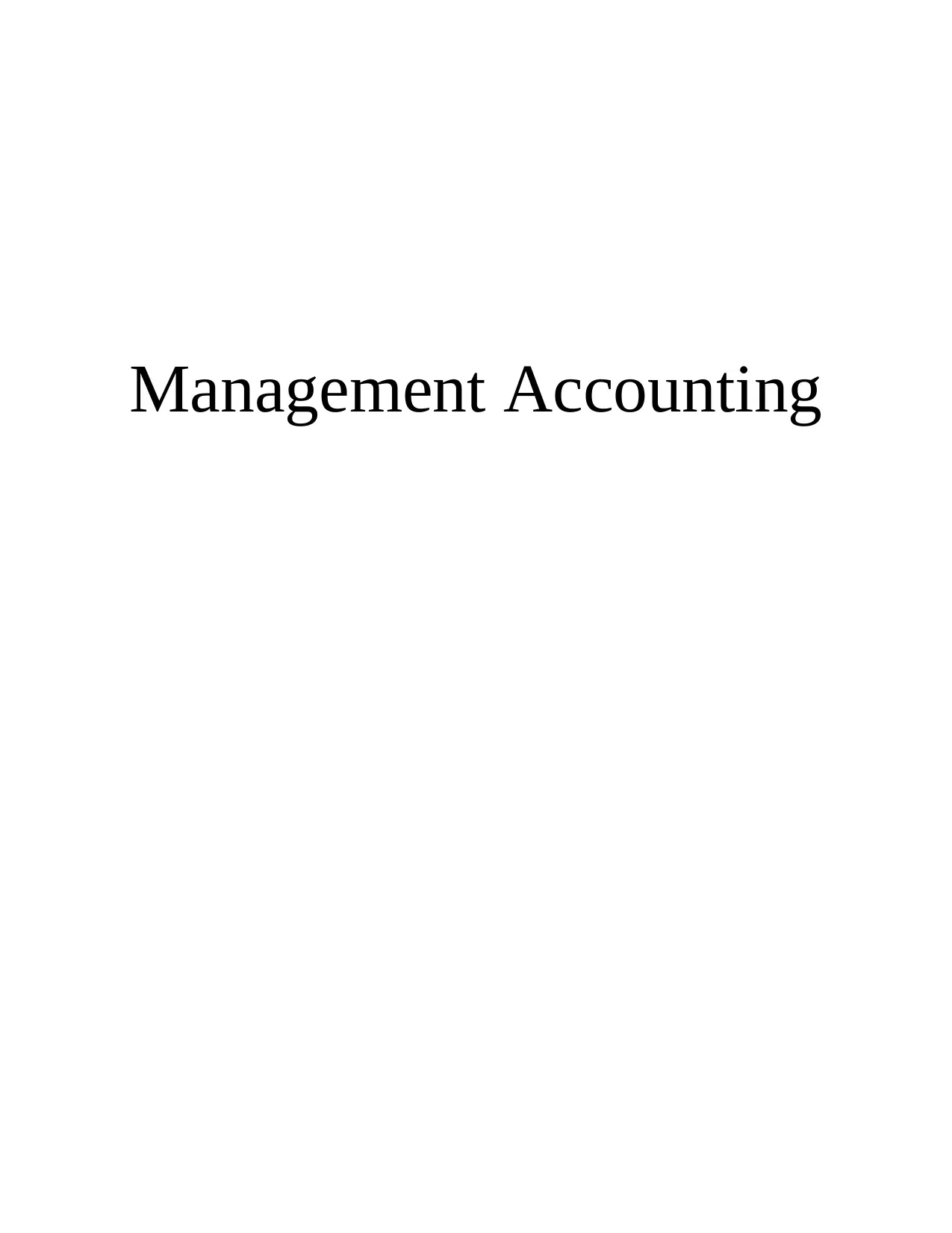
Management Accounting
Paraphrase This Document
Need a fresh take? Get an instant paraphrase of this document with our AI Paraphraser
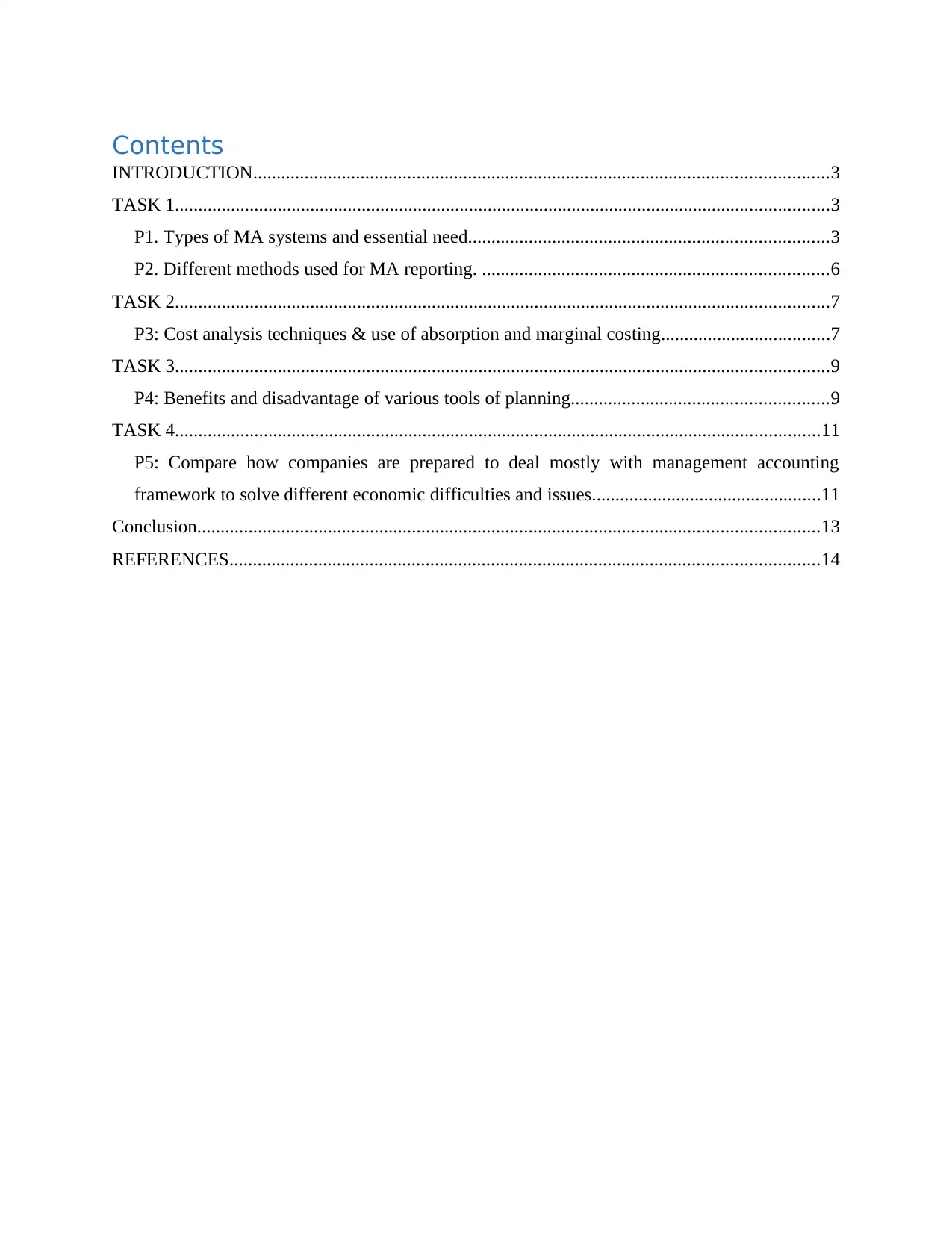
Contents
INTRODUCTION...........................................................................................................................3
TASK 1............................................................................................................................................3
P1. Types of MA systems and essential need.............................................................................3
P2. Different methods used for MA reporting. ..........................................................................6
TASK 2............................................................................................................................................7
P3: Cost analysis techniques & use of absorption and marginal costing....................................7
TASK 3............................................................................................................................................9
P4: Benefits and disadvantage of various tools of planning.......................................................9
TASK 4..........................................................................................................................................11
P5: Compare how companies are prepared to deal mostly with management accounting
framework to solve different economic difficulties and issues.................................................11
Conclusion.....................................................................................................................................13
REFERENCES..............................................................................................................................14
INTRODUCTION...........................................................................................................................3
TASK 1............................................................................................................................................3
P1. Types of MA systems and essential need.............................................................................3
P2. Different methods used for MA reporting. ..........................................................................6
TASK 2............................................................................................................................................7
P3: Cost analysis techniques & use of absorption and marginal costing....................................7
TASK 3............................................................................................................................................9
P4: Benefits and disadvantage of various tools of planning.......................................................9
TASK 4..........................................................................................................................................11
P5: Compare how companies are prepared to deal mostly with management accounting
framework to solve different economic difficulties and issues.................................................11
Conclusion.....................................................................................................................................13
REFERENCES..............................................................................................................................14
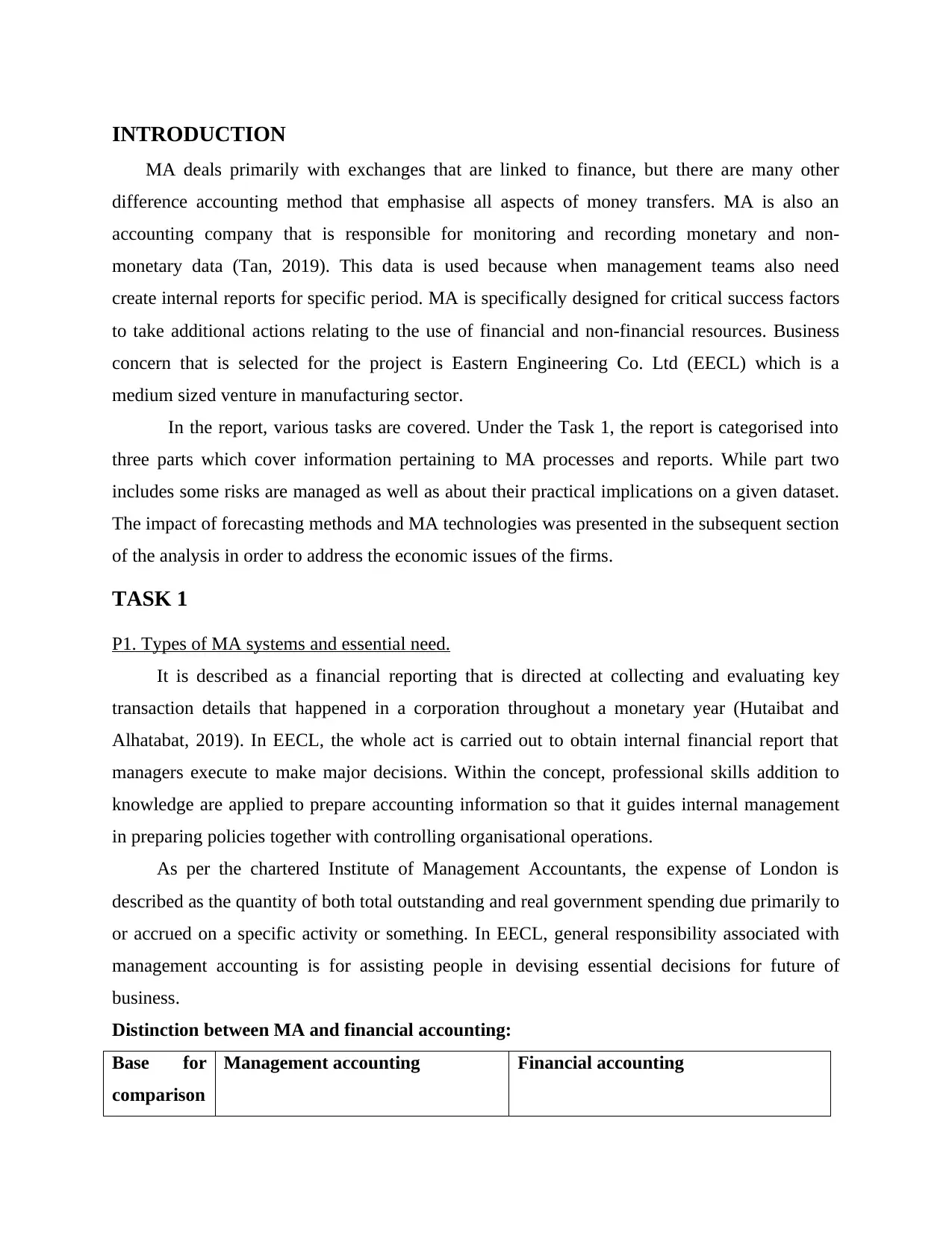
INTRODUCTION
MA deals primarily with exchanges that are linked to finance, but there are many other
difference accounting method that emphasise all aspects of money transfers. MA is also an
accounting company that is responsible for monitoring and recording monetary and non-
monetary data (Tan, 2019). This data is used because when management teams also need
create internal reports for specific period. MA is specifically designed for critical success factors
to take additional actions relating to the use of financial and non-financial resources. Business
concern that is selected for the project is Eastern Engineering Co. Ltd (EECL) which is a
medium sized venture in manufacturing sector.
In the report, various tasks are covered. Under the Task 1, the report is categorised into
three parts which cover information pertaining to MA processes and reports. While part two
includes some risks are managed as well as about their practical implications on a given dataset.
The impact of forecasting methods and MA technologies was presented in the subsequent section
of the analysis in order to address the economic issues of the firms.
TASK 1
P1. Types of MA systems and essential need.
It is described as a financial reporting that is directed at collecting and evaluating key
transaction details that happened in a corporation throughout a monetary year (Hutaibat and
Alhatabat, 2019). In EECL, the whole act is carried out to obtain internal financial report that
managers execute to make major decisions. Within the concept, professional skills addition to
knowledge are applied to prepare accounting information so that it guides internal management
in preparing policies together with controlling organisational operations.
As per the chartered Institute of Management Accountants, the expense of London is
described as the quantity of both total outstanding and real government spending due primarily to
or accrued on a specific activity or something. In EECL, general responsibility associated with
management accounting is for assisting people in devising essential decisions for future of
business.
Distinction between MA and financial accounting:
Base for
comparison
Management accounting Financial accounting
MA deals primarily with exchanges that are linked to finance, but there are many other
difference accounting method that emphasise all aspects of money transfers. MA is also an
accounting company that is responsible for monitoring and recording monetary and non-
monetary data (Tan, 2019). This data is used because when management teams also need
create internal reports for specific period. MA is specifically designed for critical success factors
to take additional actions relating to the use of financial and non-financial resources. Business
concern that is selected for the project is Eastern Engineering Co. Ltd (EECL) which is a
medium sized venture in manufacturing sector.
In the report, various tasks are covered. Under the Task 1, the report is categorised into
three parts which cover information pertaining to MA processes and reports. While part two
includes some risks are managed as well as about their practical implications on a given dataset.
The impact of forecasting methods and MA technologies was presented in the subsequent section
of the analysis in order to address the economic issues of the firms.
TASK 1
P1. Types of MA systems and essential need.
It is described as a financial reporting that is directed at collecting and evaluating key
transaction details that happened in a corporation throughout a monetary year (Hutaibat and
Alhatabat, 2019). In EECL, the whole act is carried out to obtain internal financial report that
managers execute to make major decisions. Within the concept, professional skills addition to
knowledge are applied to prepare accounting information so that it guides internal management
in preparing policies together with controlling organisational operations.
As per the chartered Institute of Management Accountants, the expense of London is
described as the quantity of both total outstanding and real government spending due primarily to
or accrued on a specific activity or something. In EECL, general responsibility associated with
management accounting is for assisting people in devising essential decisions for future of
business.
Distinction between MA and financial accounting:
Base for
comparison
Management accounting Financial accounting
⊘ This is a preview!⊘
Do you want full access?
Subscribe today to unlock all pages.

Trusted by 1+ million students worldwide
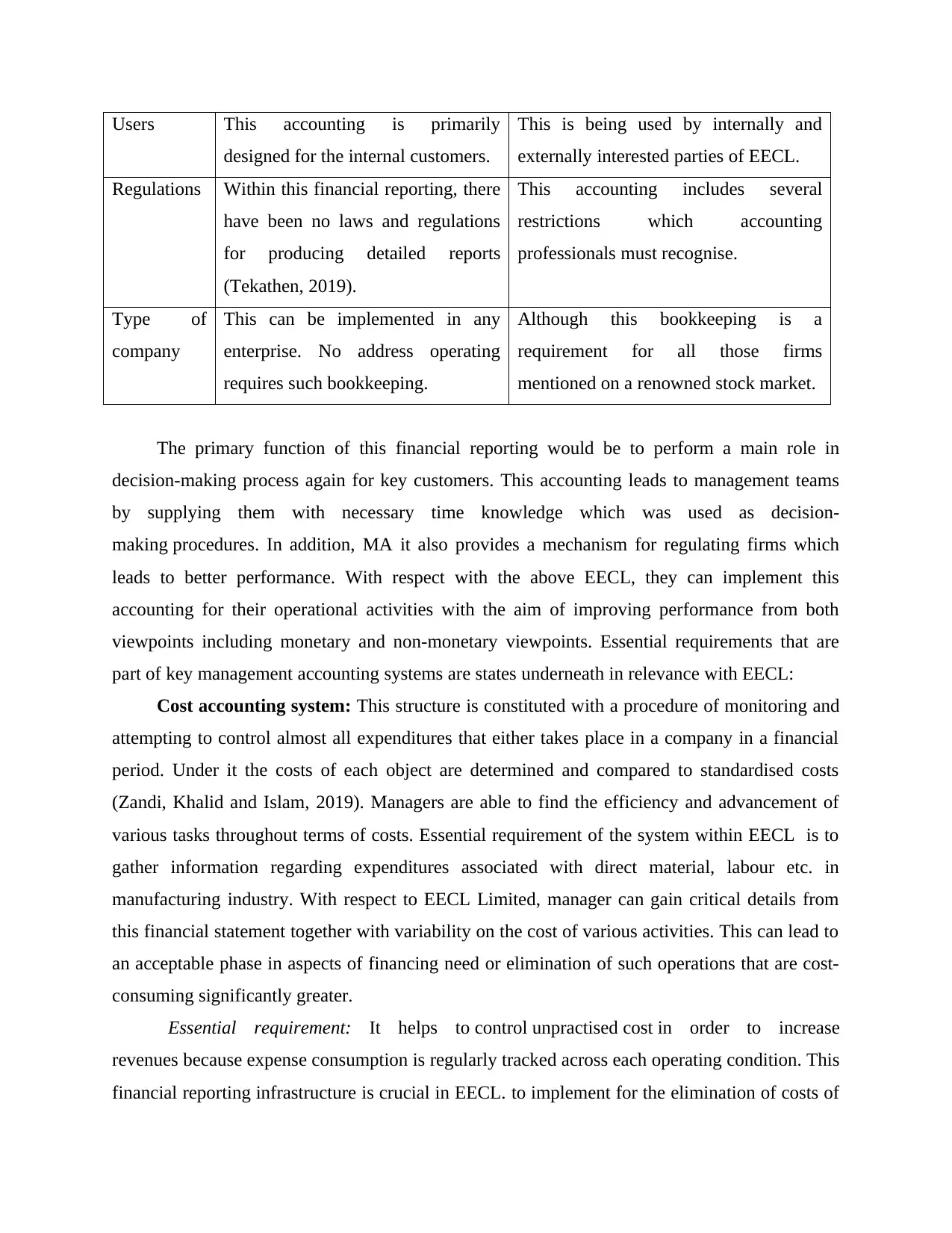
Users This accounting is primarily
designed for the internal customers.
This is being used by internally and
externally interested parties of EECL.
Regulations Within this financial reporting, there
have been no laws and regulations
for producing detailed reports
(Tekathen, 2019).
This accounting includes several
restrictions which accounting
professionals must recognise.
Type of
company
This can be implemented in any
enterprise. No address operating
requires such bookkeeping.
Although this bookkeeping is a
requirement for all those firms
mentioned on a renowned stock market.
The primary function of this financial reporting would be to perform a main role in
decision-making process again for key customers. This accounting leads to management teams
by supplying them with necessary time knowledge which was used as decision-
making procedures. In addition, MA it also provides a mechanism for regulating firms which
leads to better performance. With respect with the above EECL, they can implement this
accounting for their operational activities with the aim of improving performance from both
viewpoints including monetary and non-monetary viewpoints. Essential requirements that are
part of key management accounting systems are states underneath in relevance with EECL:
Cost accounting system: This structure is constituted with a procedure of monitoring and
attempting to control almost all expenditures that either takes place in a company in a financial
period. Under it the costs of each object are determined and compared to standardised costs
(Zandi, Khalid and Islam, 2019). Managers are able to find the efficiency and advancement of
various tasks throughout terms of costs. Essential requirement of the system within EECL is to
gather information regarding expenditures associated with direct material, labour etc. in
manufacturing industry. With respect to EECL Limited, manager can gain critical details from
this financial statement together with variability on the cost of various activities. This can lead to
an acceptable phase in aspects of financing need or elimination of such operations that are cost-
consuming significantly greater.
Essential requirement: It helps to control unpractised cost in order to increase
revenues because expense consumption is regularly tracked across each operating condition. This
financial reporting infrastructure is crucial in EECL. to implement for the elimination of costs of
designed for the internal customers.
This is being used by internally and
externally interested parties of EECL.
Regulations Within this financial reporting, there
have been no laws and regulations
for producing detailed reports
(Tekathen, 2019).
This accounting includes several
restrictions which accounting
professionals must recognise.
Type of
company
This can be implemented in any
enterprise. No address operating
requires such bookkeeping.
Although this bookkeeping is a
requirement for all those firms
mentioned on a renowned stock market.
The primary function of this financial reporting would be to perform a main role in
decision-making process again for key customers. This accounting leads to management teams
by supplying them with necessary time knowledge which was used as decision-
making procedures. In addition, MA it also provides a mechanism for regulating firms which
leads to better performance. With respect with the above EECL, they can implement this
accounting for their operational activities with the aim of improving performance from both
viewpoints including monetary and non-monetary viewpoints. Essential requirements that are
part of key management accounting systems are states underneath in relevance with EECL:
Cost accounting system: This structure is constituted with a procedure of monitoring and
attempting to control almost all expenditures that either takes place in a company in a financial
period. Under it the costs of each object are determined and compared to standardised costs
(Zandi, Khalid and Islam, 2019). Managers are able to find the efficiency and advancement of
various tasks throughout terms of costs. Essential requirement of the system within EECL is to
gather information regarding expenditures associated with direct material, labour etc. in
manufacturing industry. With respect to EECL Limited, manager can gain critical details from
this financial statement together with variability on the cost of various activities. This can lead to
an acceptable phase in aspects of financing need or elimination of such operations that are cost-
consuming significantly greater.
Essential requirement: It helps to control unpractised cost in order to increase
revenues because expense consumption is regularly tracked across each operating condition. This
financial reporting infrastructure is crucial in EECL. to implement for the elimination of costs of
Paraphrase This Document
Need a fresh take? Get an instant paraphrase of this document with our AI Paraphraser
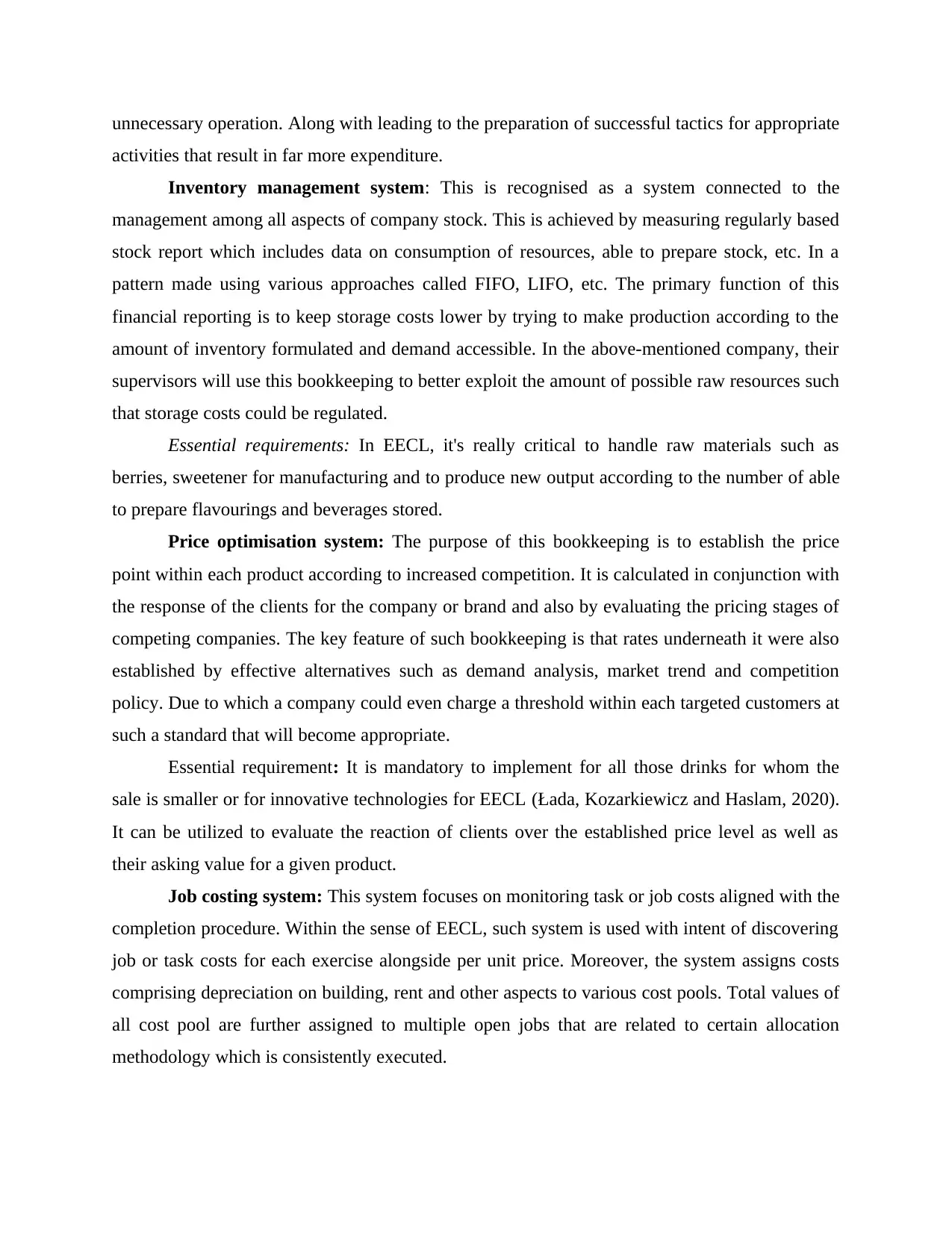
unnecessary operation. Along with leading to the preparation of successful tactics for appropriate
activities that result in far more expenditure.
Inventory management system: This is recognised as a system connected to the
management among all aspects of company stock. This is achieved by measuring regularly based
stock report which includes data on consumption of resources, able to prepare stock, etc. In a
pattern made using various approaches called FIFO, LIFO, etc. The primary function of this
financial reporting is to keep storage costs lower by trying to make production according to the
amount of inventory formulated and demand accessible. In the above-mentioned company, their
supervisors will use this bookkeeping to better exploit the amount of possible raw resources such
that storage costs could be regulated.
Essential requirements: In EECL, it's really critical to handle raw materials such as
berries, sweetener for manufacturing and to produce new output according to the number of able
to prepare flavourings and beverages stored.
Price optimisation system: The purpose of this bookkeeping is to establish the price
point within each product according to increased competition. It is calculated in conjunction with
the response of the clients for the company or brand and also by evaluating the pricing stages of
competing companies. The key feature of such bookkeeping is that rates underneath it were also
established by effective alternatives such as demand analysis, market trend and competition
policy. Due to which a company could even charge a threshold within each targeted customers at
such a standard that will become appropriate.
Essential requirement: It is mandatory to implement for all those drinks for whom the
sale is smaller or for innovative technologies for EECL (Łada, Kozarkiewicz and Haslam, 2020).
It can be utilized to evaluate the reaction of clients over the established price level as well as
their asking value for a given product.
Job costing system: This system focuses on monitoring task or job costs aligned with the
completion procedure. Within the sense of EECL, such system is used with intent of discovering
job or task costs for each exercise alongside per unit price. Moreover, the system assigns costs
comprising depreciation on building, rent and other aspects to various cost pools. Total values of
all cost pool are further assigned to multiple open jobs that are related to certain allocation
methodology which is consistently executed.
activities that result in far more expenditure.
Inventory management system: This is recognised as a system connected to the
management among all aspects of company stock. This is achieved by measuring regularly based
stock report which includes data on consumption of resources, able to prepare stock, etc. In a
pattern made using various approaches called FIFO, LIFO, etc. The primary function of this
financial reporting is to keep storage costs lower by trying to make production according to the
amount of inventory formulated and demand accessible. In the above-mentioned company, their
supervisors will use this bookkeeping to better exploit the amount of possible raw resources such
that storage costs could be regulated.
Essential requirements: In EECL, it's really critical to handle raw materials such as
berries, sweetener for manufacturing and to produce new output according to the number of able
to prepare flavourings and beverages stored.
Price optimisation system: The purpose of this bookkeeping is to establish the price
point within each product according to increased competition. It is calculated in conjunction with
the response of the clients for the company or brand and also by evaluating the pricing stages of
competing companies. The key feature of such bookkeeping is that rates underneath it were also
established by effective alternatives such as demand analysis, market trend and competition
policy. Due to which a company could even charge a threshold within each targeted customers at
such a standard that will become appropriate.
Essential requirement: It is mandatory to implement for all those drinks for whom the
sale is smaller or for innovative technologies for EECL (Łada, Kozarkiewicz and Haslam, 2020).
It can be utilized to evaluate the reaction of clients over the established price level as well as
their asking value for a given product.
Job costing system: This system focuses on monitoring task or job costs aligned with the
completion procedure. Within the sense of EECL, such system is used with intent of discovering
job or task costs for each exercise alongside per unit price. Moreover, the system assigns costs
comprising depreciation on building, rent and other aspects to various cost pools. Total values of
all cost pool are further assigned to multiple open jobs that are related to certain allocation
methodology which is consistently executed.
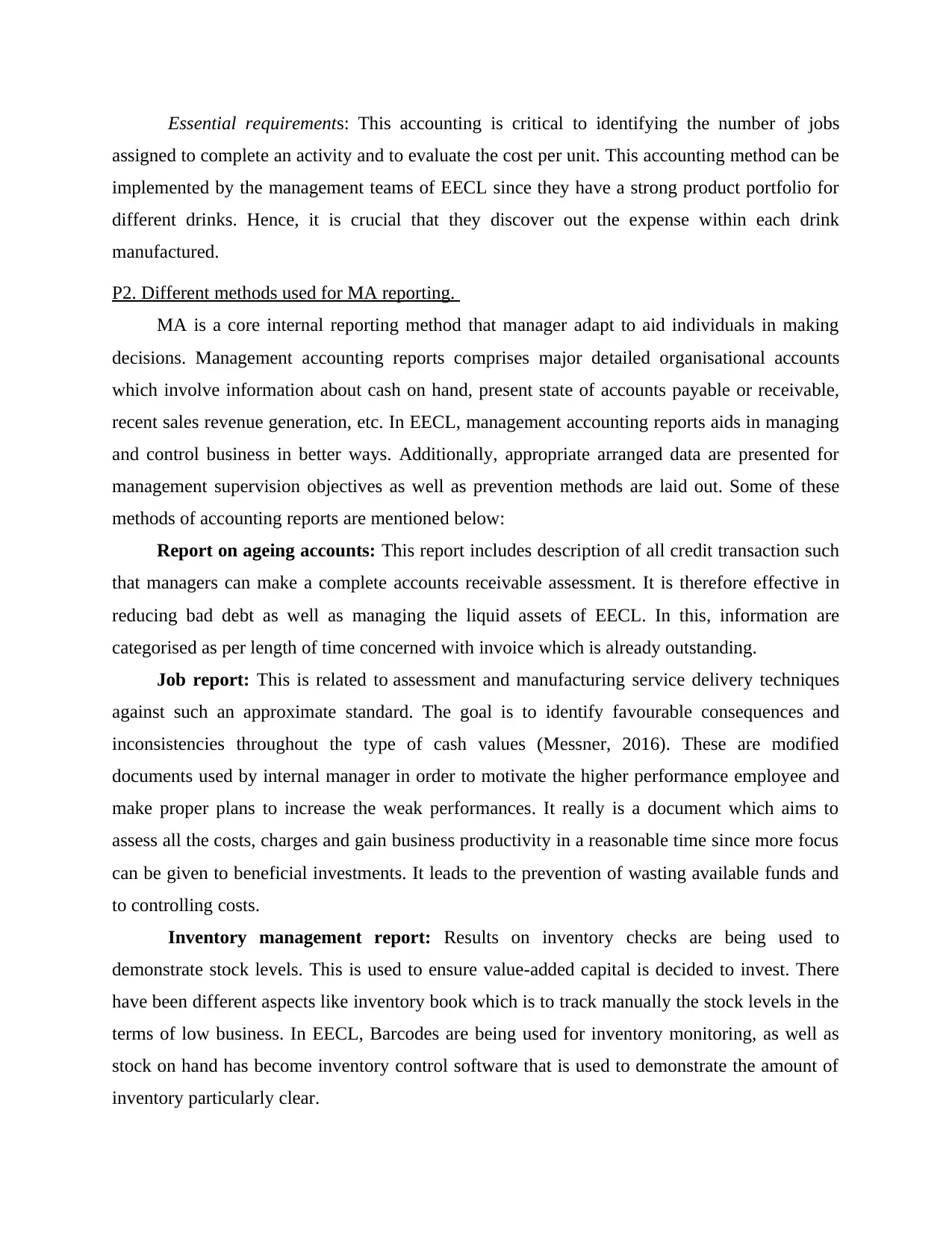
Essential requirements: This accounting is critical to identifying the number of jobs
assigned to complete an activity and to evaluate the cost per unit. This accounting method can be
implemented by the management teams of EECL since they have a strong product portfolio for
different drinks. Hence, it is crucial that they discover out the expense within each drink
manufactured.
P2. Different methods used for MA reporting.
MA is a core internal reporting method that manager adapt to aid individuals in making
decisions. Management accounting reports comprises major detailed organisational accounts
which involve information about cash on hand, present state of accounts payable or receivable,
recent sales revenue generation, etc. In EECL, management accounting reports aids in managing
and control business in better ways. Additionally, appropriate arranged data are presented for
management supervision objectives as well as prevention methods are laid out. Some of these
methods of accounting reports are mentioned below:
Report on ageing accounts: This report includes description of all credit transaction such
that managers can make a complete accounts receivable assessment. It is therefore effective in
reducing bad debt as well as managing the liquid assets of EECL. In this, information are
categorised as per length of time concerned with invoice which is already outstanding.
Job report: This is related to assessment and manufacturing service delivery techniques
against such an approximate standard. The goal is to identify favourable consequences and
inconsistencies throughout the type of cash values (Messner, 2016). These are modified
documents used by internal manager in order to motivate the higher performance employee and
make proper plans to increase the weak performances. It really is a document which aims to
assess all the costs, charges and gain business productivity in a reasonable time since more focus
can be given to beneficial investments. It leads to the prevention of wasting available funds and
to controlling costs.
Inventory management report: Results on inventory checks are being used to
demonstrate stock levels. This is used to ensure value-added capital is decided to invest. There
have been different aspects like inventory book which is to track manually the stock levels in the
terms of low business. In EECL, Barcodes are being used for inventory monitoring, as well as
stock on hand has become inventory control software that is used to demonstrate the amount of
inventory particularly clear.
assigned to complete an activity and to evaluate the cost per unit. This accounting method can be
implemented by the management teams of EECL since they have a strong product portfolio for
different drinks. Hence, it is crucial that they discover out the expense within each drink
manufactured.
P2. Different methods used for MA reporting.
MA is a core internal reporting method that manager adapt to aid individuals in making
decisions. Management accounting reports comprises major detailed organisational accounts
which involve information about cash on hand, present state of accounts payable or receivable,
recent sales revenue generation, etc. In EECL, management accounting reports aids in managing
and control business in better ways. Additionally, appropriate arranged data are presented for
management supervision objectives as well as prevention methods are laid out. Some of these
methods of accounting reports are mentioned below:
Report on ageing accounts: This report includes description of all credit transaction such
that managers can make a complete accounts receivable assessment. It is therefore effective in
reducing bad debt as well as managing the liquid assets of EECL. In this, information are
categorised as per length of time concerned with invoice which is already outstanding.
Job report: This is related to assessment and manufacturing service delivery techniques
against such an approximate standard. The goal is to identify favourable consequences and
inconsistencies throughout the type of cash values (Messner, 2016). These are modified
documents used by internal manager in order to motivate the higher performance employee and
make proper plans to increase the weak performances. It really is a document which aims to
assess all the costs, charges and gain business productivity in a reasonable time since more focus
can be given to beneficial investments. It leads to the prevention of wasting available funds and
to controlling costs.
Inventory management report: Results on inventory checks are being used to
demonstrate stock levels. This is used to ensure value-added capital is decided to invest. There
have been different aspects like inventory book which is to track manually the stock levels in the
terms of low business. In EECL, Barcodes are being used for inventory monitoring, as well as
stock on hand has become inventory control software that is used to demonstrate the amount of
inventory particularly clear.
⊘ This is a preview!⊘
Do you want full access?
Subscribe today to unlock all pages.

Trusted by 1+ million students worldwide
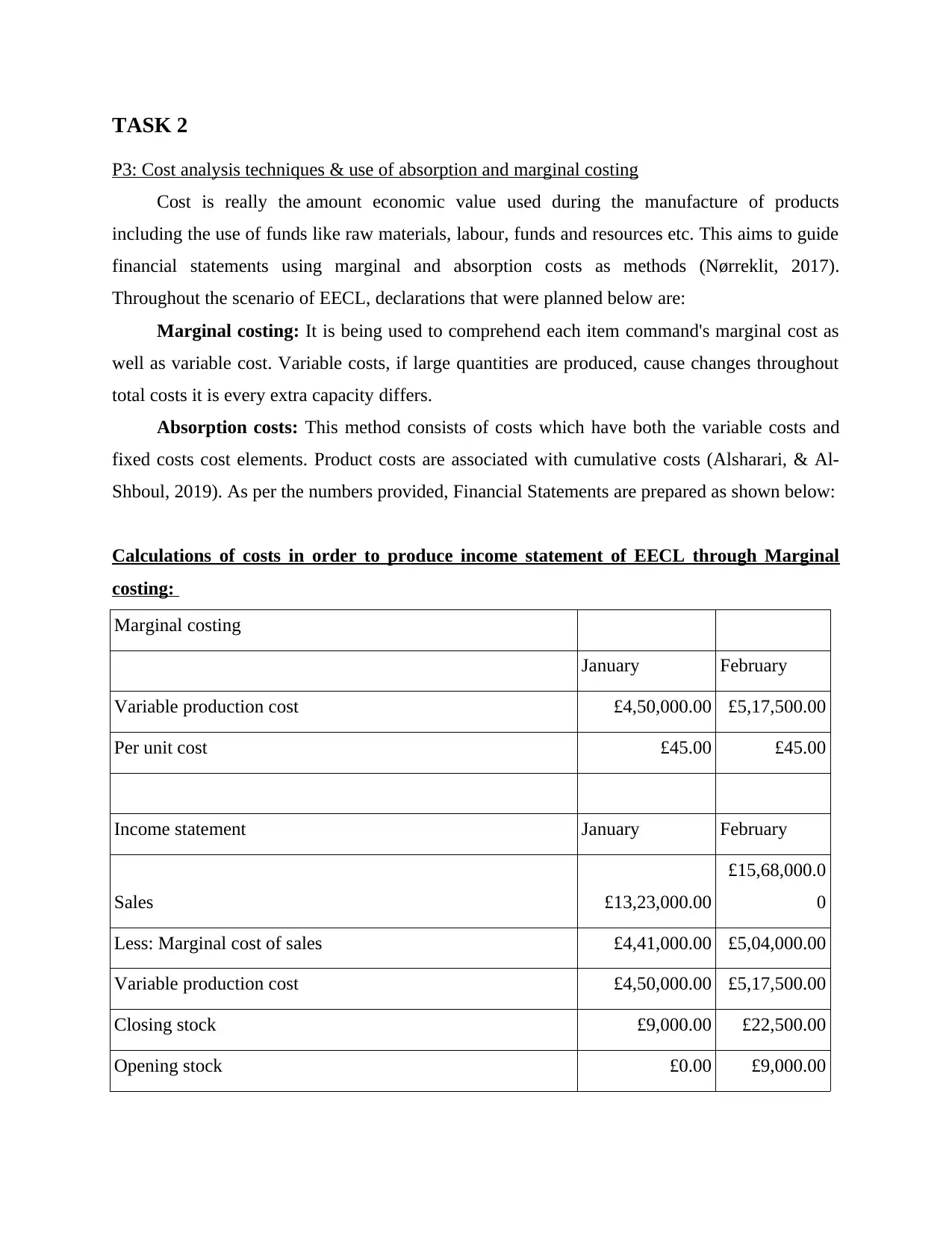
TASK 2
P3: Cost analysis techniques & use of absorption and marginal costing
Cost is really the amount economic value used during the manufacture of products
including the use of funds like raw materials, labour, funds and resources etc. This aims to guide
financial statements using marginal and absorption costs as methods (Nørreklit, 2017).
Throughout the scenario of EECL, declarations that were planned below are:
Marginal costing: It is being used to comprehend each item command's marginal cost as
well as variable cost. Variable costs, if large quantities are produced, cause changes throughout
total costs it is every extra capacity differs.
Absorption costs: This method consists of costs which have both the variable costs and
fixed costs cost elements. Product costs are associated with cumulative costs (Alsharari, & Al-
Shboul, 2019). As per the numbers provided, Financial Statements are prepared as shown below:
Calculations of costs in order to produce income statement of EECL through Marginal
costing:
Marginal costing
January February
Variable production cost £4,50,000.00 £5,17,500.00
Per unit cost £45.00 £45.00
Income statement January February
Sales £13,23,000.00
£15,68,000.0
0
Less: Marginal cost of sales £4,41,000.00 £5,04,000.00
Variable production cost £4,50,000.00 £5,17,500.00
Closing stock £9,000.00 £22,500.00
Opening stock £0.00 £9,000.00
P3: Cost analysis techniques & use of absorption and marginal costing
Cost is really the amount economic value used during the manufacture of products
including the use of funds like raw materials, labour, funds and resources etc. This aims to guide
financial statements using marginal and absorption costs as methods (Nørreklit, 2017).
Throughout the scenario of EECL, declarations that were planned below are:
Marginal costing: It is being used to comprehend each item command's marginal cost as
well as variable cost. Variable costs, if large quantities are produced, cause changes throughout
total costs it is every extra capacity differs.
Absorption costs: This method consists of costs which have both the variable costs and
fixed costs cost elements. Product costs are associated with cumulative costs (Alsharari, & Al-
Shboul, 2019). As per the numbers provided, Financial Statements are prepared as shown below:
Calculations of costs in order to produce income statement of EECL through Marginal
costing:
Marginal costing
January February
Variable production cost £4,50,000.00 £5,17,500.00
Per unit cost £45.00 £45.00
Income statement January February
Sales £13,23,000.00
£15,68,000.0
0
Less: Marginal cost of sales £4,41,000.00 £5,04,000.00
Variable production cost £4,50,000.00 £5,17,500.00
Closing stock £9,000.00 £22,500.00
Opening stock £0.00 £9,000.00
Paraphrase This Document
Need a fresh take? Get an instant paraphrase of this document with our AI Paraphraser
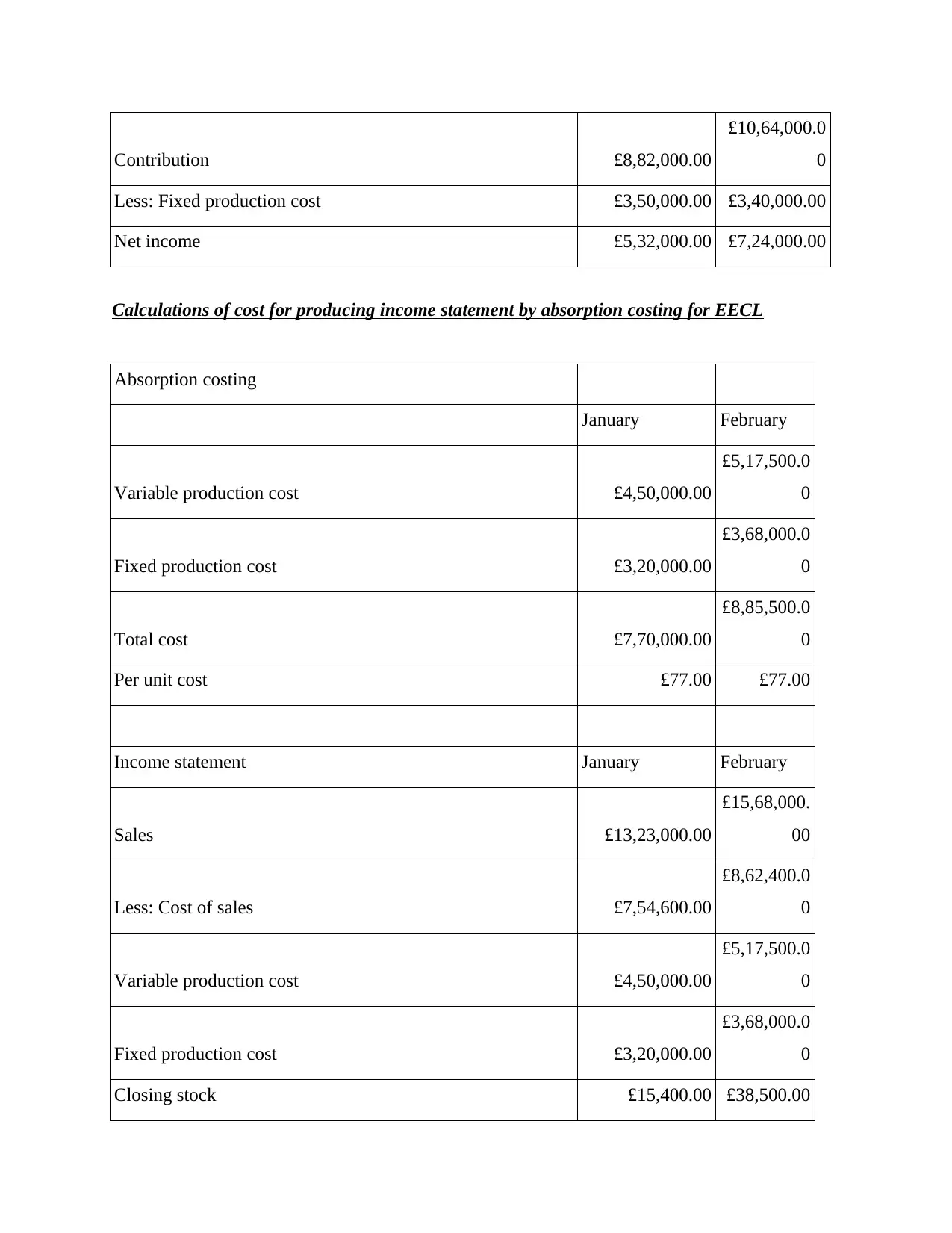
Contribution £8,82,000.00
£10,64,000.0
0
Less: Fixed production cost £3,50,000.00 £3,40,000.00
Net income £5,32,000.00 £7,24,000.00
Calculations of cost for producing income statement by absorption costing for EECL
Absorption costing
January February
Variable production cost £4,50,000.00
£5,17,500.0
0
Fixed production cost £3,20,000.00
£3,68,000.0
0
Total cost £7,70,000.00
£8,85,500.0
0
Per unit cost £77.00 £77.00
Income statement January February
Sales £13,23,000.00
£15,68,000.
00
Less: Cost of sales £7,54,600.00
£8,62,400.0
0
Variable production cost £4,50,000.00
£5,17,500.0
0
Fixed production cost £3,20,000.00
£3,68,000.0
0
Closing stock £15,400.00 £38,500.00
£10,64,000.0
0
Less: Fixed production cost £3,50,000.00 £3,40,000.00
Net income £5,32,000.00 £7,24,000.00
Calculations of cost for producing income statement by absorption costing for EECL
Absorption costing
January February
Variable production cost £4,50,000.00
£5,17,500.0
0
Fixed production cost £3,20,000.00
£3,68,000.0
0
Total cost £7,70,000.00
£8,85,500.0
0
Per unit cost £77.00 £77.00
Income statement January February
Sales £13,23,000.00
£15,68,000.
00
Less: Cost of sales £7,54,600.00
£8,62,400.0
0
Variable production cost £4,50,000.00
£5,17,500.0
0
Fixed production cost £3,20,000.00
£3,68,000.0
0
Closing stock £15,400.00 £38,500.00
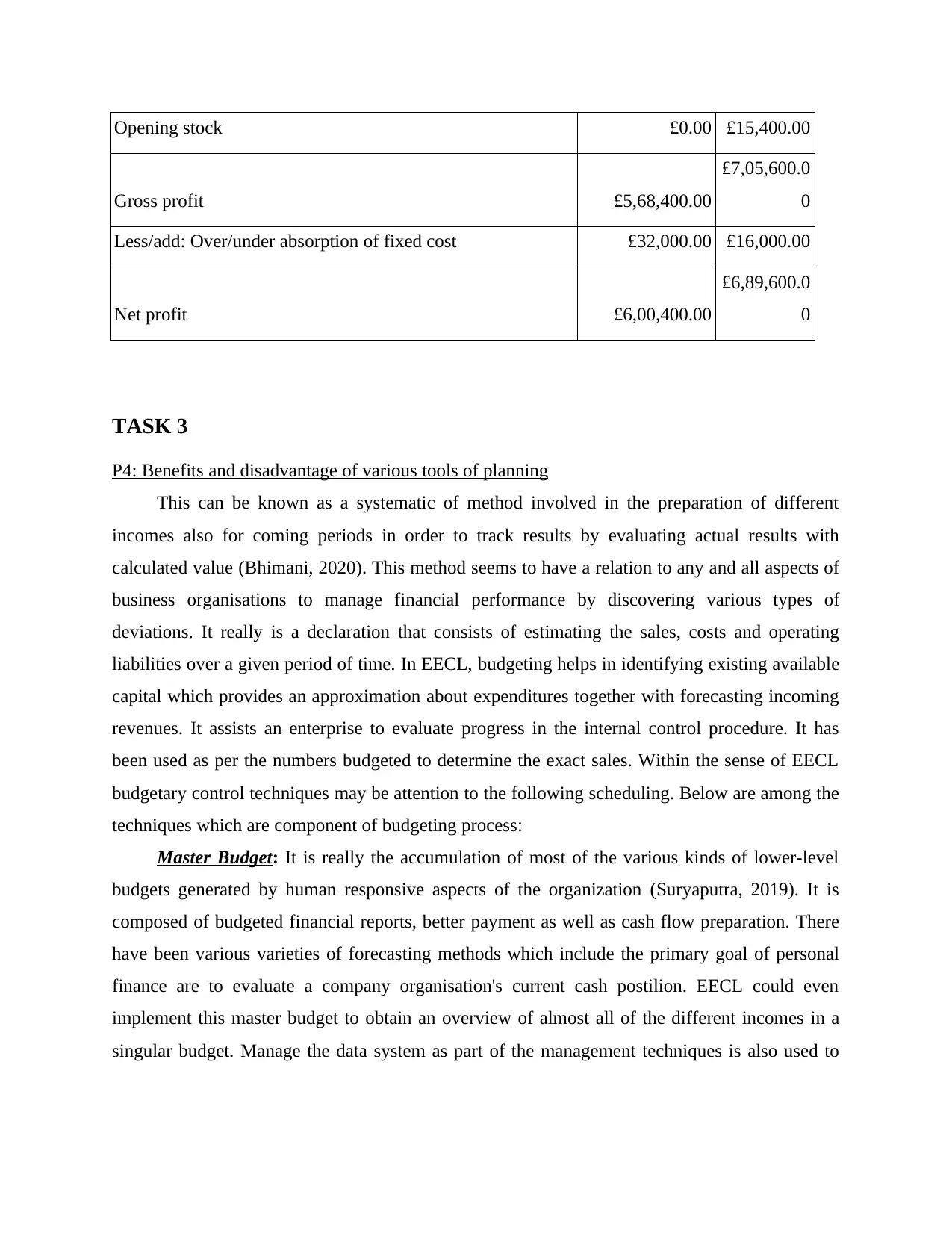
Opening stock £0.00 £15,400.00
Gross profit £5,68,400.00
£7,05,600.0
0
Less/add: Over/under absorption of fixed cost £32,000.00 £16,000.00
Net profit £6,00,400.00
£6,89,600.0
0
TASK 3
P4: Benefits and disadvantage of various tools of planning
This can be known as a systematic of method involved in the preparation of different
incomes also for coming periods in order to track results by evaluating actual results with
calculated value (Bhimani, 2020). This method seems to have a relation to any and all aspects of
business organisations to manage financial performance by discovering various types of
deviations. It really is a declaration that consists of estimating the sales, costs and operating
liabilities over a given period of time. In EECL, budgeting helps in identifying existing available
capital which provides an approximation about expenditures together with forecasting incoming
revenues. It assists an enterprise to evaluate progress in the internal control procedure. It has
been used as per the numbers budgeted to determine the exact sales. Within the sense of EECL
budgetary control techniques may be attention to the following scheduling. Below are among the
techniques which are component of budgeting process:
Master Budget: It is really the accumulation of most of the various kinds of lower-level
budgets generated by human responsive aspects of the organization (Suryaputra, 2019). It is
composed of budgeted financial reports, better payment as well as cash flow preparation. There
have been various varieties of forecasting methods which include the primary goal of personal
finance are to evaluate a company organisation's current cash postilion. EECL could even
implement this master budget to obtain an overview of almost all of the different incomes in a
singular budget. Manage the data system as part of the management techniques is also used to
Gross profit £5,68,400.00
£7,05,600.0
0
Less/add: Over/under absorption of fixed cost £32,000.00 £16,000.00
Net profit £6,00,400.00
£6,89,600.0
0
TASK 3
P4: Benefits and disadvantage of various tools of planning
This can be known as a systematic of method involved in the preparation of different
incomes also for coming periods in order to track results by evaluating actual results with
calculated value (Bhimani, 2020). This method seems to have a relation to any and all aspects of
business organisations to manage financial performance by discovering various types of
deviations. It really is a declaration that consists of estimating the sales, costs and operating
liabilities over a given period of time. In EECL, budgeting helps in identifying existing available
capital which provides an approximation about expenditures together with forecasting incoming
revenues. It assists an enterprise to evaluate progress in the internal control procedure. It has
been used as per the numbers budgeted to determine the exact sales. Within the sense of EECL
budgetary control techniques may be attention to the following scheduling. Below are among the
techniques which are component of budgeting process:
Master Budget: It is really the accumulation of most of the various kinds of lower-level
budgets generated by human responsive aspects of the organization (Suryaputra, 2019). It is
composed of budgeted financial reports, better payment as well as cash flow preparation. There
have been various varieties of forecasting methods which include the primary goal of personal
finance are to evaluate a company organisation's current cash postilion. EECL could even
implement this master budget to obtain an overview of almost all of the different incomes in a
singular budget. Manage the data system as part of the management techniques is also used to
⊘ This is a preview!⊘
Do you want full access?
Subscribe today to unlock all pages.

Trusted by 1+ million students worldwide
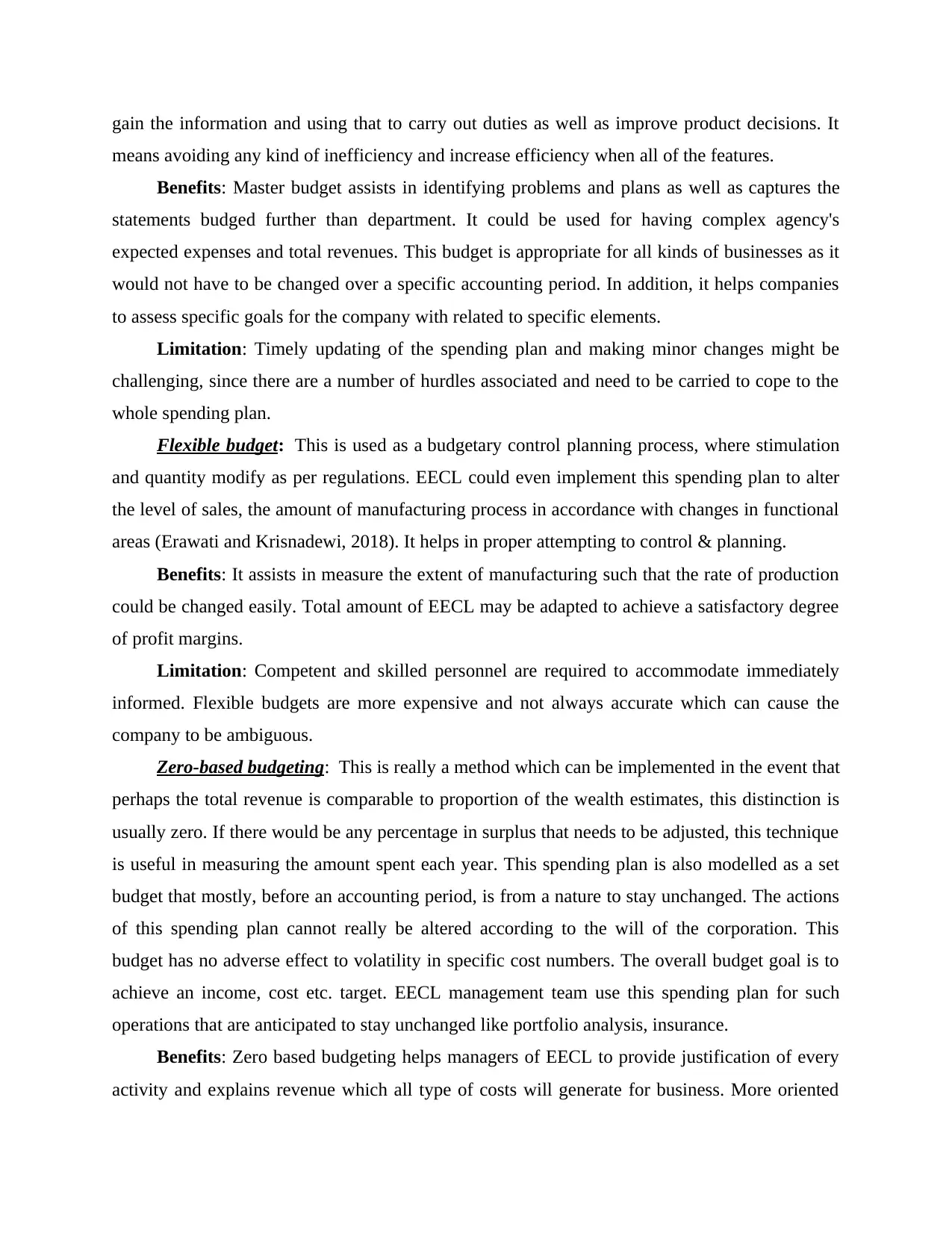
gain the information and using that to carry out duties as well as improve product decisions. It
means avoiding any kind of inefficiency and increase efficiency when all of the features.
Benefits: Master budget assists in identifying problems and plans as well as captures the
statements budged further than department. It could be used for having complex agency's
expected expenses and total revenues. This budget is appropriate for all kinds of businesses as it
would not have to be changed over a specific accounting period. In addition, it helps companies
to assess specific goals for the company with related to specific elements.
Limitation: Timely updating of the spending plan and making minor changes might be
challenging, since there are a number of hurdles associated and need to be carried to cope to the
whole spending plan.
Flexible budget: This is used as a budgetary control planning process, where stimulation
and quantity modify as per regulations. EECL could even implement this spending plan to alter
the level of sales, the amount of manufacturing process in accordance with changes in functional
areas (Erawati and Krisnadewi, 2018). It helps in proper attempting to control & planning.
Benefits: It assists in measure the extent of manufacturing such that the rate of production
could be changed easily. Total amount of EECL may be adapted to achieve a satisfactory degree
of profit margins.
Limitation: Competent and skilled personnel are required to accommodate immediately
informed. Flexible budgets are more expensive and not always accurate which can cause the
company to be ambiguous.
Zero-based budgeting: This is really a method which can be implemented in the event that
perhaps the total revenue is comparable to proportion of the wealth estimates, this distinction is
usually zero. If there would be any percentage in surplus that needs to be adjusted, this technique
is useful in measuring the amount spent each year. This spending plan is also modelled as a set
budget that mostly, before an accounting period, is from a nature to stay unchanged. The actions
of this spending plan cannot really be altered according to the will of the corporation. This
budget has no adverse effect to volatility in specific cost numbers. The overall budget goal is to
achieve an income, cost etc. target. EECL management team use this spending plan for such
operations that are anticipated to stay unchanged like portfolio analysis, insurance.
Benefits: Zero based budgeting helps managers of EECL to provide justification of every
activity and explains revenue which all type of costs will generate for business. More oriented
means avoiding any kind of inefficiency and increase efficiency when all of the features.
Benefits: Master budget assists in identifying problems and plans as well as captures the
statements budged further than department. It could be used for having complex agency's
expected expenses and total revenues. This budget is appropriate for all kinds of businesses as it
would not have to be changed over a specific accounting period. In addition, it helps companies
to assess specific goals for the company with related to specific elements.
Limitation: Timely updating of the spending plan and making minor changes might be
challenging, since there are a number of hurdles associated and need to be carried to cope to the
whole spending plan.
Flexible budget: This is used as a budgetary control planning process, where stimulation
and quantity modify as per regulations. EECL could even implement this spending plan to alter
the level of sales, the amount of manufacturing process in accordance with changes in functional
areas (Erawati and Krisnadewi, 2018). It helps in proper attempting to control & planning.
Benefits: It assists in measure the extent of manufacturing such that the rate of production
could be changed easily. Total amount of EECL may be adapted to achieve a satisfactory degree
of profit margins.
Limitation: Competent and skilled personnel are required to accommodate immediately
informed. Flexible budgets are more expensive and not always accurate which can cause the
company to be ambiguous.
Zero-based budgeting: This is really a method which can be implemented in the event that
perhaps the total revenue is comparable to proportion of the wealth estimates, this distinction is
usually zero. If there would be any percentage in surplus that needs to be adjusted, this technique
is useful in measuring the amount spent each year. This spending plan is also modelled as a set
budget that mostly, before an accounting period, is from a nature to stay unchanged. The actions
of this spending plan cannot really be altered according to the will of the corporation. This
budget has no adverse effect to volatility in specific cost numbers. The overall budget goal is to
achieve an income, cost etc. target. EECL management team use this spending plan for such
operations that are anticipated to stay unchanged like portfolio analysis, insurance.
Benefits: Zero based budgeting helps managers of EECL to provide justification of every
activity and explains revenue which all type of costs will generate for business. More oriented
Paraphrase This Document
Need a fresh take? Get an instant paraphrase of this document with our AI Paraphraser
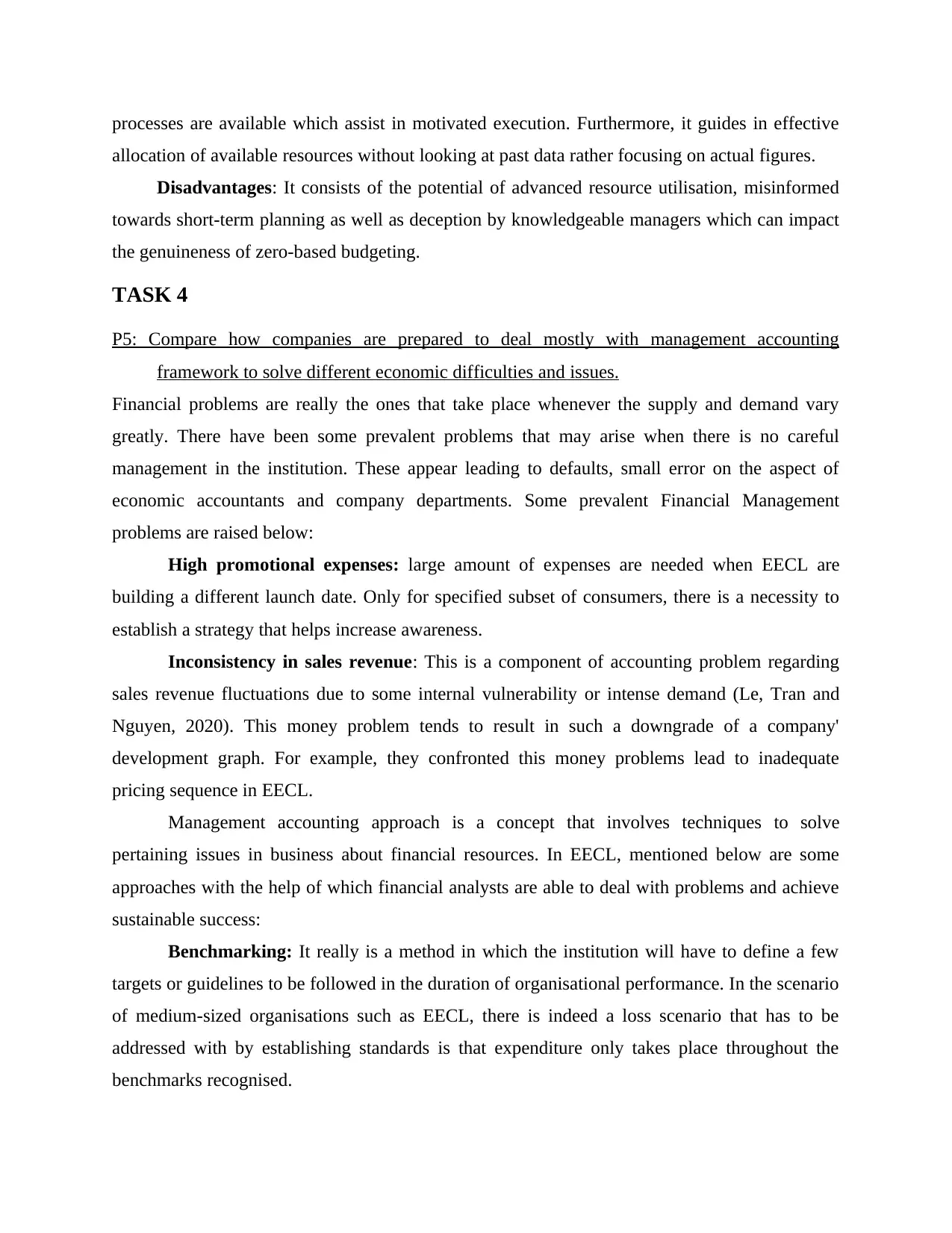
processes are available which assist in motivated execution. Furthermore, it guides in effective
allocation of available resources without looking at past data rather focusing on actual figures.
Disadvantages: It consists of the potential of advanced resource utilisation, misinformed
towards short-term planning as well as deception by knowledgeable managers which can impact
the genuineness of zero-based budgeting.
TASK 4
P5: Compare how companies are prepared to deal mostly with management accounting
framework to solve different economic difficulties and issues.
Financial problems are really the ones that take place whenever the supply and demand vary
greatly. There have been some prevalent problems that may arise when there is no careful
management in the institution. These appear leading to defaults, small error on the aspect of
economic accountants and company departments. Some prevalent Financial Management
problems are raised below:
High promotional expenses: large amount of expenses are needed when EECL are
building a different launch date. Only for specified subset of consumers, there is a necessity to
establish a strategy that helps increase awareness.
Inconsistency in sales revenue: This is a component of accounting problem regarding
sales revenue fluctuations due to some internal vulnerability or intense demand (Le, Tran and
Nguyen, 2020). This money problem tends to result in such a downgrade of a company'
development graph. For example, they confronted this money problems lead to inadequate
pricing sequence in EECL.
Management accounting approach is a concept that involves techniques to solve
pertaining issues in business about financial resources. In EECL, mentioned below are some
approaches with the help of which financial analysts are able to deal with problems and achieve
sustainable success:
Benchmarking: It really is a method in which the institution will have to define a few
targets or guidelines to be followed in the duration of organisational performance. In the scenario
of medium-sized organisations such as EECL, there is indeed a loss scenario that has to be
addressed with by establishing standards is that expenditure only takes place throughout the
benchmarks recognised.
allocation of available resources without looking at past data rather focusing on actual figures.
Disadvantages: It consists of the potential of advanced resource utilisation, misinformed
towards short-term planning as well as deception by knowledgeable managers which can impact
the genuineness of zero-based budgeting.
TASK 4
P5: Compare how companies are prepared to deal mostly with management accounting
framework to solve different economic difficulties and issues.
Financial problems are really the ones that take place whenever the supply and demand vary
greatly. There have been some prevalent problems that may arise when there is no careful
management in the institution. These appear leading to defaults, small error on the aspect of
economic accountants and company departments. Some prevalent Financial Management
problems are raised below:
High promotional expenses: large amount of expenses are needed when EECL are
building a different launch date. Only for specified subset of consumers, there is a necessity to
establish a strategy that helps increase awareness.
Inconsistency in sales revenue: This is a component of accounting problem regarding
sales revenue fluctuations due to some internal vulnerability or intense demand (Le, Tran and
Nguyen, 2020). This money problem tends to result in such a downgrade of a company'
development graph. For example, they confronted this money problems lead to inadequate
pricing sequence in EECL.
Management accounting approach is a concept that involves techniques to solve
pertaining issues in business about financial resources. In EECL, mentioned below are some
approaches with the help of which financial analysts are able to deal with problems and achieve
sustainable success:
Benchmarking: It really is a method in which the institution will have to define a few
targets or guidelines to be followed in the duration of organisational performance. In the scenario
of medium-sized organisations such as EECL, there is indeed a loss scenario that has to be
addressed with by establishing standards is that expenditure only takes place throughout the
benchmarks recognised.
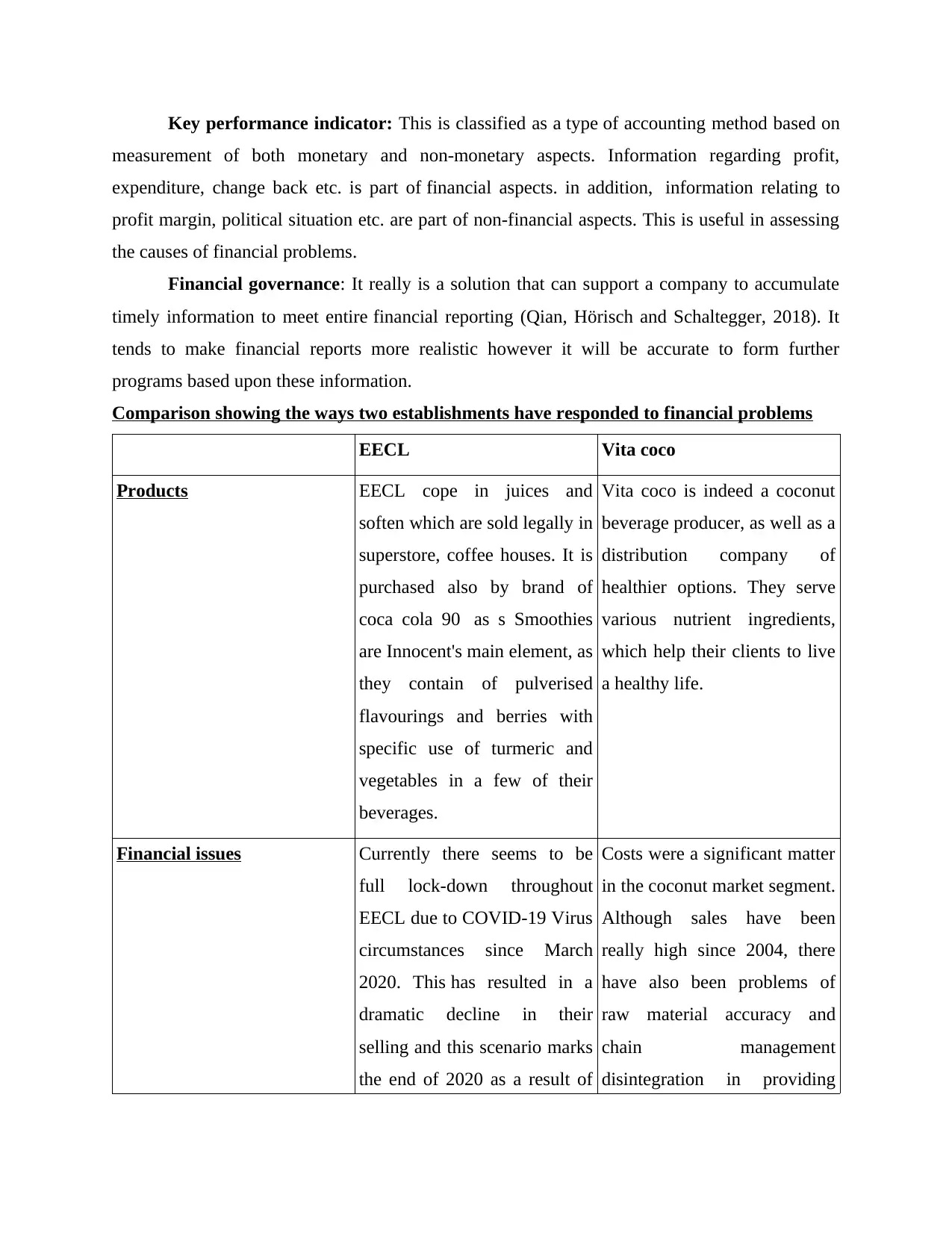
Key performance indicator: This is classified as a type of accounting method based on
measurement of both monetary and non-monetary aspects. Information regarding profit,
expenditure, change back etc. is part of financial aspects. in addition, information relating to
profit margin, political situation etc. are part of non-financial aspects. This is useful in assessing
the causes of financial problems.
Financial governance: It really is a solution that can support a company to accumulate
timely information to meet entire financial reporting (Qian, Hörisch and Schaltegger, 2018). It
tends to make financial reports more realistic however it will be accurate to form further
programs based upon these information.
Comparison showing the ways two establishments have responded to financial problems
EECL Vita coco
Products EECL cope in juices and
soften which are sold legally in
superstore, coffee houses. It is
purchased also by brand of
coca cola 90 as s Smoothies
are Innocent's main element, as
they contain of pulverised
flavourings and berries with
specific use of turmeric and
vegetables in a few of their
beverages.
Vita coco is indeed a coconut
beverage producer, as well as a
distribution company of
healthier options. They serve
various nutrient ingredients,
which help their clients to live
a healthy life.
Financial issues Currently there seems to be
full lock-down throughout
EECL due to COVID-19 Virus
circumstances since March
2020. This has resulted in a
dramatic decline in their
selling and this scenario marks
the end of 2020 as a result of
Costs were a significant matter
in the coconut market segment.
Although sales have been
really high since 2004, there
have also been problems of
raw material accuracy and
chain management
disintegration in providing
measurement of both monetary and non-monetary aspects. Information regarding profit,
expenditure, change back etc. is part of financial aspects. in addition, information relating to
profit margin, political situation etc. are part of non-financial aspects. This is useful in assessing
the causes of financial problems.
Financial governance: It really is a solution that can support a company to accumulate
timely information to meet entire financial reporting (Qian, Hörisch and Schaltegger, 2018). It
tends to make financial reports more realistic however it will be accurate to form further
programs based upon these information.
Comparison showing the ways two establishments have responded to financial problems
EECL Vita coco
Products EECL cope in juices and
soften which are sold legally in
superstore, coffee houses. It is
purchased also by brand of
coca cola 90 as s Smoothies
are Innocent's main element, as
they contain of pulverised
flavourings and berries with
specific use of turmeric and
vegetables in a few of their
beverages.
Vita coco is indeed a coconut
beverage producer, as well as a
distribution company of
healthier options. They serve
various nutrient ingredients,
which help their clients to live
a healthy life.
Financial issues Currently there seems to be
full lock-down throughout
EECL due to COVID-19 Virus
circumstances since March
2020. This has resulted in a
dramatic decline in their
selling and this scenario marks
the end of 2020 as a result of
Costs were a significant matter
in the coconut market segment.
Although sales have been
really high since 2004, there
have also been problems of
raw material accuracy and
chain management
disintegration in providing
⊘ This is a preview!⊘
Do you want full access?
Subscribe today to unlock all pages.

Trusted by 1+ million students worldwide
1 out of 15
Related Documents
Your All-in-One AI-Powered Toolkit for Academic Success.
+13062052269
info@desklib.com
Available 24*7 on WhatsApp / Email
![[object Object]](/_next/static/media/star-bottom.7253800d.svg)
Unlock your academic potential
Copyright © 2020–2026 A2Z Services. All Rights Reserved. Developed and managed by ZUCOL.





